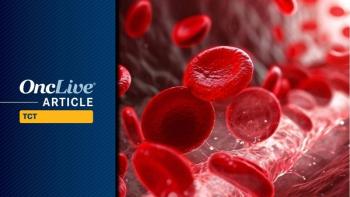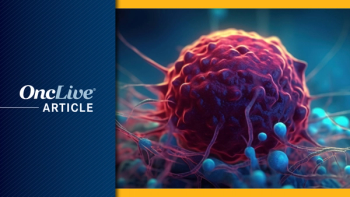
IDH Inhibition Shows Promise in Two Early Phase AML Studies
The IDH1 inhibitor AG-120 and the IDH2 inhibitor AG-221 have demonstrated promising outcomes in patients with hematologic malignancies, including those with acute myeloid leukemia in two separate phase I clinical trials.
Chris Bowden, MD
The IDH1 inhibitor AG-120 and the IDH2 inhibitor AG-221 have demonstrated promising response rates in patients with acute myeloid leukemia (AML) and other hematologic malignancies across two separate phase I clinical trials presented at the 20th Congress of the European Hematology Association (EHA).
In the first study, the objective response rate (ORR) with AG-221 was 40% in patients with relapsed or refractory AML and other IDH2-mutant positive advanced hematologic malignancies. The duration of response was more than 15 months at the analysis, and remained ongoing. Overall, 76% of responses lasted longer than 6 months.
In the second study, AG-120 demonstrated an ORR of 31% in patients with AML and IDH1-mutant positive advanced hematologic malignancies. The median duration of response with AG-120 was 11 months. Based on earlier data for AG-120, the FDA granted the medication an orphan drug designation for patients with AML.
“Receiving orphan drug designation for AG-120 is an important milestone as we continue to move this program to late-stage development,” Chris Bowden, MD, chief medical officer of Agios, the company developing the drug, said in a statement. “We believe that AG-120, which is on track to initiate multiple expansion cohorts in the next month, has the potential to play a significant role in shifting the treatment paradigm for IDH1-mutant positive hematologic cancers from the conventional chemotherapy approach.”
In the AG-221 study, there was a dose escalation portion followed by the enrollment of 100 patients across 4 expansion arms, with 25 patients in each group. The first expansion arm included patients over the age of 60 years with relapsed or refractory AML who were transplantation ineligible. The second arm looked at those with relapsed or refractory AML under age 60. The third arm included those with untreated AML who decided not to receive standard chemotherapy and the final group contained patients with IDH2 mutation positive hematologic malignancies.
Data presented at EHA were from the dose escalation portion and from the 4 expansion cohorts. Across all of the arms, there were 177 patients at a median age of 69 years. Of these patients, 158 were evaluable for efficacy. Doses ranging from 60 mg to 450 mg daily were explored in the study, with a maximum tolerated dose not achieved. In the expansion cohorts, a 100 mg daily dose was utilized.
In patients who responded in the full population, the complete response (CR) rate was 16%. In patients specifically with relapsed or refractory AML, the ORR was 41%, with a CR rate of 18%. In untreated patients with AML, the ORR was 32%, with a CR rate of 14%. In 14 patients enrolled with myelodysplastic syndrome (MDS), 50% experienced a response, including a CR rate of 14%. ORRs also consisted of CRs in the marrow and those with incomplete platelet recovery.
The most frequently reported adverse events were nausea, fatigue, increased blood bilirubin, and diarrhea. These were noted to be mild to moderate in severity. Twenty-seven treatment-related serious adverse events were seen in the study.
The phase I study will continue to recruit patients into a fifth expansion arm that will enroll 125 patients with IDH2 mutation-positive AML who are in second or later relapse, refractory to second-line induction or reinduction treatment, or have relapsed after allogeneic transplantation. Additionally, Agios plans to initiate a phase III study geared toward FDA approval in the second half of 2015 for patients with IDH2-positive relapsed/refractory AML.
“The clinical profile of AG-221 continues to be impressive from the perspectives of response rate, durability, safety and unique mechanism of action,” lead investigator Courtney DiNardo, MD, assistant professor, leukemia at University of Texas MD Anderson Cancer Center, said in a statement. “Additionally, it is encouraging to see early proof-of-concept in myelodysplastic syndrome and untreated acute myeloid leukemia given the need for more effective therapies for these patients.”
The second study presented at EHA examined patients with AML and other IDH1-positive advanced hematologic malignancies who received AG-120 at 100 mg to 1200 mg daily. The median age of patients was 68 years.
In 52 evaluable patients, the ORR was 31%, half of which were CRs (50%). In total, 79% of patients remained on treatment for 3 months or longer, with 50% receiving therapy for longer than 6 months.
The most common adverse events in 57 evaluable patients were fatigue, diarrhea, pyrexia, and nausea. Four patients in the study developed leukocytosis that was potentially related to AG-120. The maximum tolerated dose in this investigation was not yet reached.
A series of expansion cohorts are scheduled to open for further evaluation of AG-120 for patients with AML and IDH1-positive cancer. Additionally, Agios announced plans to initiate a phase III investigation in 2016.
“The durable clinical activity observed with AG-120 in such a refractory patient population is impressive,” lead investigator Stéphane de Botton, MD, from the Institut de Cancérologie Gustave Roussy, Villejuif, France, said in a statement. “These findings provide additional evidence that AG-120 can inhibit the IDH1-mutant protein allowing for cancer cells to appropriately mature. AG-120 has the potential to improve outcomes in patients with IDH1 mutant cancers.”
The IDH1 and IDH2 metabolic enzymes are commonly mutated in a variety of malignancies. When these enzymes are mutated, they produce alpha-ketoglutarate and 2-hydroxyglutarate, causing abnormal histone and DNA methylation. In patients with AML, IDH1 mutations occur in approximately 6% to 10% of cases while IDH2 mutations occur in 9% to 13% of patients.



































